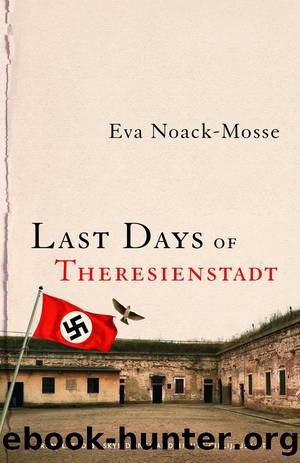Last Days of Theresienstadt by Eva Noack-Mosse

Author:Eva Noack-Mosse [Noack-Mosse, Eva]
Language: eng
Format: epub
ISBN: 9780299319632
Google: bmrxvQEACAAJ
Publisher: University of Wisconsin Press
Published: 2018-11-15T00:24:58.953523+00:00
One of the most unbearable prohibitions for men was the prohibition against smoking.76 The SS confiscated all smoking material from unsuspecting new arrivals. No one knew how many of these confiscated goods were then secretly sold back to the Jews at astronomical prices. At any rate, the smuggling of cigarettes was widespread. In February 1945, two cigarettes were worth half a loaf of bread, that is, the bread ration for three days. Some of the men were so crazy for cigarettes that they would go hungry in order to obtain two of them. Unconfirmed rumors said that this smuggling was secretly fostered by the SS. One cigarette came to cost up to twenty deutsche marks.77 According to the law, one was not allowed to be in possession of those twenty deutsche marks: apart from the currency used in the ghetto possession of money was strictly forbidden. From time to time, whoever was involved in smuggling got arrested. They were taken to the so-called Small Fortress: an old prison outside of the city limits that now served as a prison for criminals from the camp and political detainees. Gavrilo Princip, who had murdered the heir to the Austrian throne, Franz Ferdinand, on 28 June 1914 was imprisoned there until he died from tuberculosis in Theresienstadt.78
The men imprisoned in the Small Fortress had to carry out extraordinarily taxing physical labor.79 Barely one in a hundred survived such torments. Women had it easier. They spent a large part of the day trying to free themselves from lice, remained in bed, and slept in order to suffer less from hunger. Only three times during a week would they receive some food: a few thin slices of bread and some watery soup. The local population knew about it and made the sacrifice of secretly leaving some food on their windowsills.
On 23 February 1945, the last group of cigarette smugglers had been brought to the Small Fortress. In the lists of the names sent to our office I found quite a number of crossed out names, with the annotation âto Stapo on 23 February 1945.â
Another grave crime consisted in sending illicit letters. Those who got caught were punished the same way as the cigarette smugglers.
Since it was forbidden to express wishes on the postcards one wrote, there was an extraordinary scarcity of certain things. Among the rarest and most coveted objects were toothbrushes, hairpins, soap, elastic bands, thread, and stockings. I exchanged a second toothbrush that I had brought for a large piece of sausageâa precious treasure. The sausage came, of course, from a charity parcel.
Sending parcels to Theresienstadt was permitted.80 A large percentage of shipped packages did arrive at the camp. Few people in Germany knew about it, since the confirmation notes for these parcels did not always arrive. The Czechs were better off in this respect. They were allowed to have a parcel, up to forty pounds, sent to them once a month. Family members and friends bought what they could, of course, and sent to their imprisoned relatives and friends what they could spare.
Download
This site does not store any files on its server. We only index and link to content provided by other sites. Please contact the content providers to delete copyright contents if any and email us, we'll remove relevant links or contents immediately.
Harry Potter and the Goblet Of Fire by J.K. Rowling(3133)
Never by Ken Follett(2950)
Unfinished: A Memoir by Priyanka Chopra Jonas(2936)
Machine Learning at Scale with H2O by Gregory Keys | David Whiting(2359)
The Man Who Died Twice by Richard Osman(2337)
Fairy Tale by Stephen King(2137)
Will by Will Smith(2106)
Rationality by Steven Pinker(1796)
The Storyteller by Dave Grohl(1691)
The Dawn of Everything: A New History of Humanity by David Graeber & David Wengrow(1609)
The Dark Hours by Michael Connelly(1608)
The Stranger in the Lifeboat by Mitch Albom(1585)
Cloud Cuckoo Land by Anthony Doerr(1466)
New Morning Mercies: A Daily Gospel Devotional by Paul David Tripp(1443)
Friends, Lovers, and the Big Terrible Thing by Matthew Perry(1380)
The Becoming by Nora Roberts(1361)
Crying in H Mart by Michelle Zauner(1358)
Einstein: His Life and Universe by Walter Isaacson(1342)
A Short History of War by Jeremy Black(1324)
